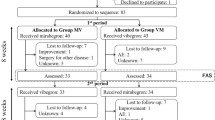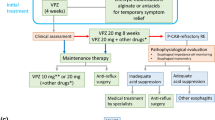Abstract
Background
The aim of this study was to compare the efficacy of combination therapy with desmopressin and an anticholinergic to desmopressin monotherapy for the first-line treatment of children with primary monosymptomatic nocturnal enuresis (PMNE).
Methods
A total of 98 children with PMNE (male:female 71:27) aged 5–16 (mean age 7.18 ± 1.8) years were retrospectively analyzed. The patients were divided into two groups: the monotherapy group (n = 49) was given oral desmopressin alone, and the combination therapy group (n = 49) was given desmopressin plus an anticholinergic (propiverine 10 mg) as a first-line treatment. The two groups were matched according to the following criteria: age, gender, and baseline frequency of nocturnal enuresis. The efficacy was evaluated by International Children’s Continence Society criteria at 1 and 3 months after treatment initiation.
Results
The combination therapy group showed a higher rate of complete response than the monotherapy group (20.4 vs. 6.1 % at 1 month of treatment; 46.9 vs. 22.4 % at 3 months of treatment). In terms of success (response and complete response), there was a significant difference between the two groups after 3 months of treatment (P = 0.002).
Conclusions
Our results indicate that combination therapy with desmopressin plus an anticholinergic is quicker and more effective than desmopressin monotherapy in reducing PMNE.
Similar content being viewed by others
References
Robson WL (2009) Clinical practice. Evaluation and management of enuresis. N Engl J Med 360:1429–1436
Nevéus T, von Gontard A, Hoebeke P, Hjälmås K, Bauer S, Bower W, Jørgensen TM, Rittig S, Walle JV, Yeung CK, Djurhuus JC (2006) The standardization of terminology of lower urinary tract function in children and adolescents: report from the Standardisation Committee of the International Children’s Continence Society. J Urol 176:314–324
Glazener CM, Evans JH (2002) Desmopressin for nocturnal enuresis in children. Cochrane Database Syst Rev 3:CD002112
Yeung CK, Sit FK, To LK, Chiu HN, Sihoe JD, Lee E, Wong C (2002) Reduction in nocturnal functional bladder capacity is a common factor in the pathogenesis of refractory nocturnal enuresis. BJU Int 90:302–307
Montaldo P, Tafuro L, Rea M, Narciso V, Iossa AC, Del Gado R (2012) Desmopressin and oxybutynin in monosymptomatic nocturnal enuresis: a randomized, double-blind, placebo-controlled trial and an assessment of predictive factors. BJU Int 110:381–386
Austin PF, Ferguson G, Yan Y, Campigotto MJ, Royer ME, Coplen DE (2008) Combination therapy with desmopressin and an anticholinergic medication for nonresponders to desmopressin for monosymptomatic nocturnal enuresis: a randomized, double-blind, placebo-controlled trial. Pediatrics 122:1027–1032
Lee T, Suh HJ, Lee HJ, Lee JE (2005) Comparison of effects of treatment of primary nocturnal enuresis with oxybutynin plus desmopressin, desmopressin alone or imipramine alone: a randomized controlled clinical trial. J Urol 174:1084–1087
Kirk J, Rasmussen PV, Rittig S, Djurhuus JC (1995) Micturition habits and bladder capacity in normal children and in patients with desmopressin-resistant enuresis. Scand J Urol Nephrol Suppl 173:49–50
Benninga MA, Candy DC, Taminiau JA (2005) New treatment options in childhood constipation? J Pediatr Gastroenterol Nutr 41:56–57
Snajderová M, Lehotská V, Kernová T, Kocnarová N, Archmanová E, Janda P, Lánská V (2001) Desmopressin in a long-term treatment of children with primary nocturnal enuresis—a symptomatic therapy? Eur J Pediatr 160:197–198
Kwak KW, Lee YS, Park KH, Baek M (2010) Efficacy of desmopressin and enuresis alarm as first and second line treatment for primary monosymptomatic nocturnal enuresis: prospective randomized crossover study. J Urol 184:2521–2526
Radvanska E, Kovacs L, Rittig S (2006) The role of bladder capacity in antidiuretic and anticholinergic treatment for nocturnal enuresis. J Urol 176:764–768
Caione P, Arena F, Biraghi M, Cigna RM, Chendi D, Chiozza ML, De Lisa A, De Grazia E, Fano M, Formica P, Garofalo S, Gramenzi R, von Heland M, Lanza P, Lanza T, Maffei S, Manieri C, Merlini E, Miano L, Nappo S, Pagliarulo A, Paolini Paoletti F, Pau AC, Porru D, Artibani W (1997) Nocturnal enuresis and daytime wetting: a multicentric trial with oxybutynin and desmopressin. Eur Urol 31:459–463
Hodges SJ, Atala A (2011) A randomized, double-blind, placebo-controlled trial of anticholinergic medication for nonresponders to desmopressin for monosymptomatic nocturnal enuresis. Curr Urol Rep 12:1–2
Alloussi SH, Mürtz G, Gitzhofer S, Eichel R, Lang C, Madersbacher H, Strugala G, Alloussi S (2009) Failure of monotherapy in primary monosymptomatic enuresis: a combined desmopressin and propiverine treatment regimen improves efficacy outcomes. BJU Int 103:1706–1712
Alloussi SH, Mürtz G, Lang C, Madersbacher H, Strugala G, Seibold J, Schwentner C, Stenzl A, Alloussi S (2011) Desmopressin treatment regimens in monosymptomatic and nonmonosymptomatic enuresis: A review from a clinical perspective. J Pediatr Urol 7:10–20
Zaffanello M, Giacomello L, Brugnara M, Fanos V (2007) Therapeutic options in childhood nocturnal enuresis. Minerva Urol Nefrol 59:199–205
Madersbacher H, Mürtz G (2001) Efficacy, tolerability and safety profile of propiverine in the treatment of the overactive bladder (non-neurogenic and neurogenic). World J Urol 19:324–335
Kwak KW, Park KH (2008) Clinical inconsistency of lower urinary tract symptoms between questionnaire and bladder diary in children with nocturnal enuresis. J Urol 180:1085–1089
O’Regan S, Yazbeck S, Schick E (1985) Constipation, bladder instability, urinary tract infection syndrome. Clin Nephrol 23:152–154
Alloussi S, Mürtz G, Braun R, Gerhardt U, Heinrich M, Hellmis E, Horn W, Marschall-Kehrel D, Niklas K, Raabe M, Rössler T, Seibt B, Siemer S, Schultz-Lampel D, Walter H, Wiedeking B, Alloussi S, Bock P, Strugala G, Madersbacher H (2010) Efficacy, tolerability and safety of propiverine hydrochloride in comparison to oxybutynin in children with urge incontinence due to overactive bladder: Results of a multicentre observational cohort study. BJU Int 106:550–556
Marschall-Kehrel D, Feustel C, Persson de Geeter C, Stehr M, Radmayr C, Sillén U, Strugala G (2009) Treatment with propiverine in children suffering from nonneurogenic overactive bladder and urinary incontinence: results of a randomized placebo-controlled phase 3 clinical trial. Eur Urol 55:729–736
Kim WJ, Lee DG, Lee SW, Lee YK, Lee JS, Park KH, Baek M (2012) Efficacy and safety of propiverine in children with overactive bladder. Korean J Urol 53:275–279
Funding
This study was supported by Samsung Medical Center grant (CRS 1110631).
Declaration of interest
None.
Author information
Authors and Affiliations
Consortia
Corresponding author
Rights and permissions
About this article
Cite this article
Park, S.J., Park, J.M., Pai, K.S. et al. Desmopressin alone versus desmopressin and an anticholinergic in the first-line treatment of primary monosymptomatic nocturnal enuresis: a multicenter study. Pediatr Nephrol 29, 1195–1200 (2014). https://doi.org/10.1007/s00467-014-2751-5
Received:
Revised:
Accepted:
Published:
Issue Date:
DOI: https://doi.org/10.1007/s00467-014-2751-5




